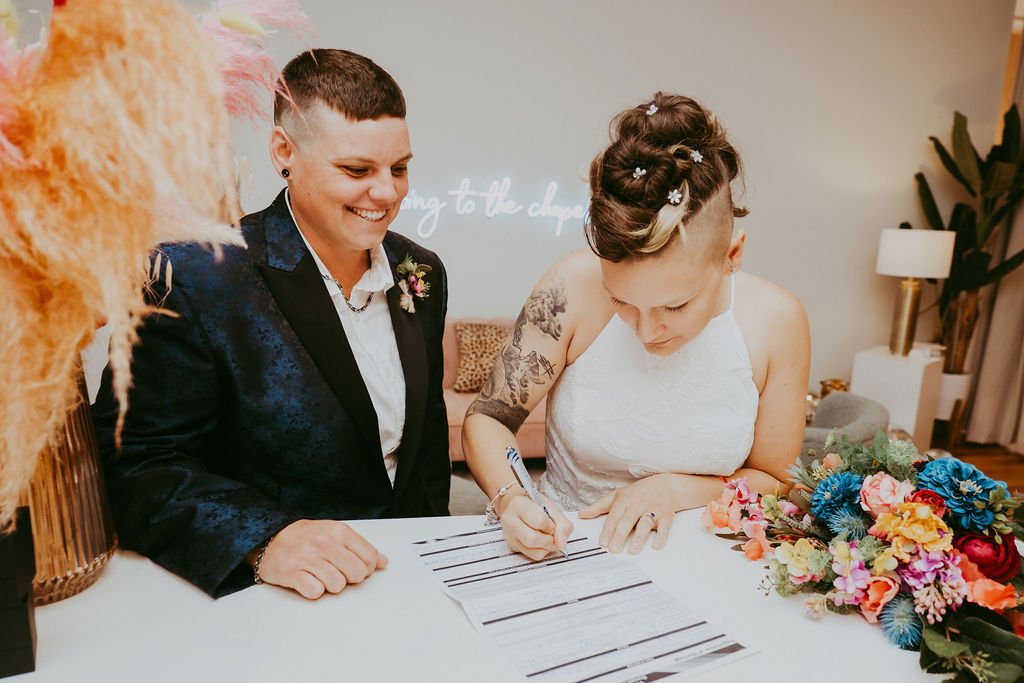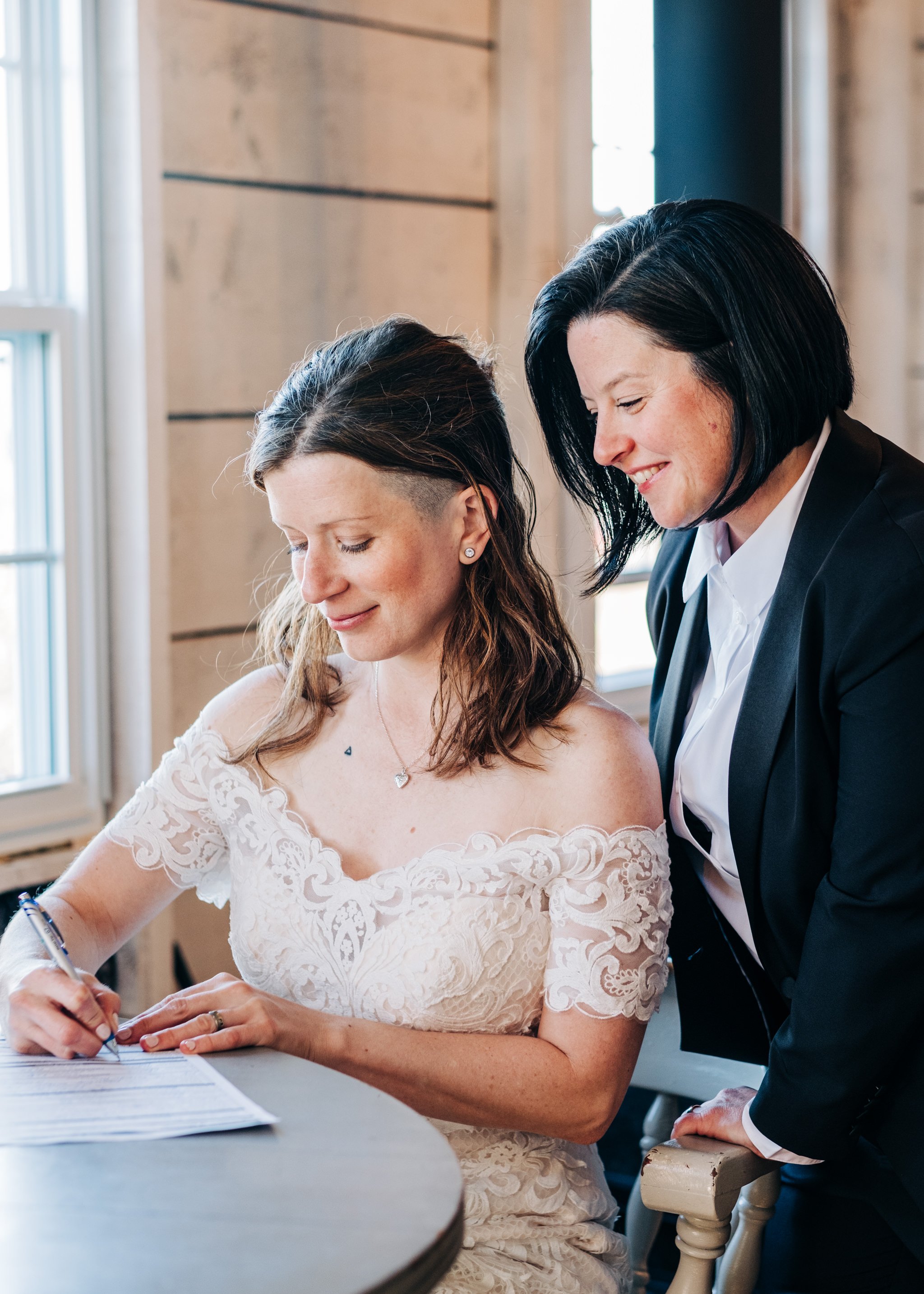How To Change Your Name After Marriage in Nova Scotia
The vows have been said, the rings exchanged, and the epic post-celebration party has been had with all your friends and family. While you might be ready to jet-set off on your honeymoon or just bask in all the feels of your newlywed life, you’re not off the hook yet. Changing your last name after the wedding (if that’s the plan) involves a few more boxes to check off to make everything official. For the record - we’re all about ditching traditions. If you prefer to not change your name there is nothing that obliges you to. You do you boo!
How To Change Your Name, and Other Logistics of Marriage, in Nova Scotia
Whether you’ve said “I do” during an intimate ceremony with a couple of witnesses and washed it down with cheeseburgers, or had a full-blown giant church service in downtown Halifax; your wedding vows alone won’t seal the deal - you’ve got to sign the papers. After that, figuring out how to change your name after marriage isn’t always as easy. It can be a difficult decision for some couples in the first place, then add on the sometimes confusing and always time-consuming paperwork that might make you want to scream. But don’t stress. We’ve got you covered with these steps to help you navigate all the red tape. Below is a step-by-step for the bureaucratic logistics of marriage in Nova Scotia.
Step 1 – You Will Need Your Marriage Certificate
On your wedding day your officiant helps you fill our your paperwork and you’re often left with a “keepsake” certificate. After your nuptials, your Justice of the Peace, judge, or religious representative has 48 hours to submit your paperwork to officially register your marriage through Vital Statistics. Your marriage needs to be registered before a certificate can be issued. A Marriage Certificate takes 2-3 months to receive and costs about $40.
Step 2 – Complete Change of Name Application
Once you’ve received your marriage certificate, you can then begin the process of completing your Change of Name Application form. You’ll need to make sure you have all the necessary documentation to submit your paperwork, and don’t forget to include your payment. It takes about 6-8 weeks to receive your Change of Name Certificate and an updated Marriage Certificate.
Step 3 – Update your passport
Now that your name has officially been changed with Vital Statistics, you’ll need to make sure your legal documents follow suit. Your passport is a great place to start unless you’re planning on leaving the country shortly after changing your name. If you’re planning on doing some post-ceremony travel, it’s best to wait until you have some time to spare to tackle all this as it takes time. You’ll need to bring your current passport, your marriage license, a new passport photo, and your completed application.
Step 4 – Update your bank accounts and cards
You’ll need to contact each bank and institution you hold accounts with to see their specific requirements to change your name. Some banks won’t require your new marriage certificate, while others will. Unfortunately, a one-way ticket to the DMV is also in your near future. In order to change the legal name on your driver’s license, you’ll have to visit an Access Nova Scotia office near you. Take a look at their website or phone ahead to make sure you have all the necessary documents.
While it’s doubtful that these steps will be more fun than tying the knot, they are necessary to changing you name. Luckily, the whole process is pretty painless (albeit time-consuming), so don’t get too worked up about it and look forward to the fun parts of planning your big day.
Should You Change Your Name After Marriage?
Whether it’s before or after you get hitched, the question of changing your name will likely come up at some point. While this long-serving tradition is still very much alive, every couple is different. Whether you want everything to match or prefer to keep some individuality, marriage (just like your wedding) doesn’t have to be one particular way. If you’re torn between traditional and contemporary approaches to last names after marriage, read on about the perks and headaches of what it means to make the big change.
Pros
Everyone in the family will have the same last name. For couples considering children, this might weigh heavily on the decision.
If you dislike your given name, taking a new name gives you a fresh start.
Some newlyweds admit it brings them a shared sense of unity.
If you’re in a heterosexual marriage, often people will assume you have changed your name anyways. Traditions be like that right? If you want to beat them to the punch and avoid a potential lifetime of correcting people maybe a name change is in the cards.
Cons
The Big One – the paperwork. Updating important documents isn’t a quick afternoon errand. Save yourself 10+hours of your life, a few dollars, and keep your given name.
Business logistics can become tricky with a name change if you’re a freelancer, own a namesake company or are well-known in your career field.
If you’re proud of your roots and don’t want to end the family name, you might consider your lineage before signing your name change application.
Changing your last name may feel like a loss of self or identity. You’ve had this name your whole life, make sure to consider how the change will feel.
You might just want to keep your last name simply because you want to (which is totally valid). Maybe it’s rad, maybe it’s fun to say, maybe it’s just because you like it.
FAQ
How much does it cost to change my name in Nova Scotia?
In order to process your application, you will be charged a fee of $165.70 plus applicable taxes. There is also an additional fee to have your marriage license amended (or changes to other records) to your new married name costing $24.95 for each record.
Is changing my name mandatory?
Absolutely not. It is not mandatory to change a last name after marriage. Most people choose to change or hyphenate their name after they tie the knot, but some people decide not to change their name at all or some folks get creative and make up their own new last name. You get to decide together what approach you wish to take.
Will my name change automatically after marriage?
Getting married does not legally change a name, no. Although either partner may legally assume their spouse’s name, this does not constitute a legal change of name. You will have to follow the steps above to start signing your new surname.
When do I have to change my name after getting married?
Many people wonder before getting married if there is a set time limit to how long they have to change their name after getting married. We’re here to tell you there is none. You can wait however long you’d like to change your name or simply not do it at all!




